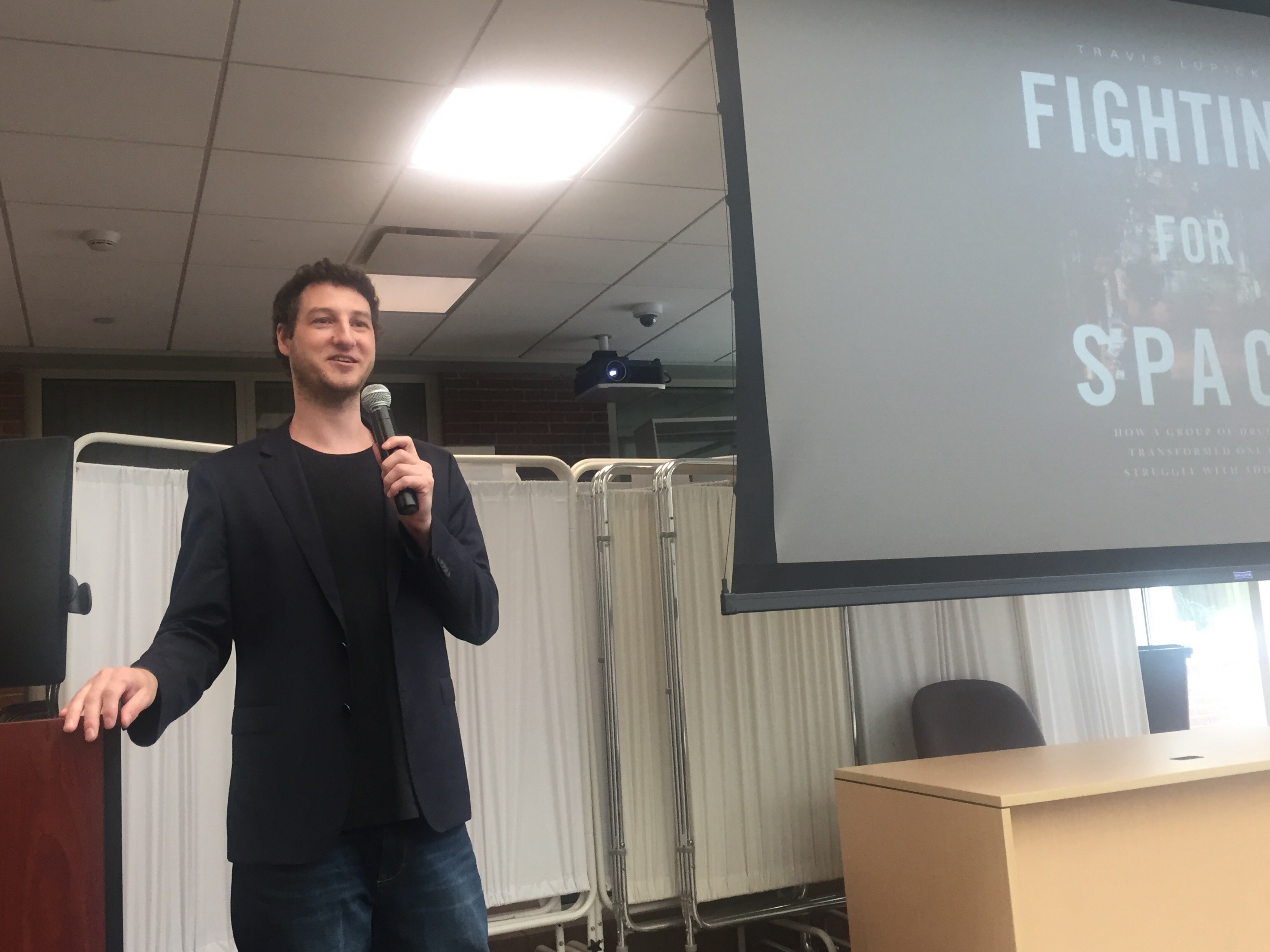A Canadian journalist’s book on harm reduction in Vancouver is coming to the United States, and the Boston Health Care for the Homeless Program hosted the author for a discussion and book launch. In “Fighting for Space: How a Group of Drug Users Transformed One City’s Struggle with Addiction,” Travis Lupick provides a detailed look on how attitudes changed during one of the world’s worst public health crises in the developed world.
Harm reduction, Travis Lupick argues, grew from a grassroots effort of advocacy and thoughtful individuals who saw the growing drug epidemic of the 90s as a serious issue in Downtown Eastside, Vancouver. For example, some efforts consist of supervised injection sites, supportive housing and needle exchange programs.
“There were 400 fatal overdoses across British Columbia. A few years later, after harm reduction programs were deployed, after North America’s first supervised injection site INSITE opened in 2003, that number was reduced to an average of 204 per year,” said Lupick, a staff writer at Vancouver’s Georgia Strait. “If you’ve studied health outcomes at all you know a 50 percent reduction is a success, and a 50 percent reduction that is sustained for an entire decade is a big success … and then fentanyl arrived.”
His book also covers the success of programs, such as Boston Health Care for the Homeless, in the U.S. In his opinion, Lupick said harm reduction strategies are working in Boston.
“I think the building that we’re in is evidence of that,” he said of Boston Health Care for the Homeless. “They reverse five overdoses a week here – I just learned that this morning. That’s five people alive every week that might not be otherwise.”
Lupick spoke broadly about the drug users’ movement and North America’s first safe injection site, INSITE, while highlighting the people who made it happen.
While talking about the “no-judgement oasis” that was Downtown Eastside, Vancouver, Lupick drew similarities to the area of Boston known as “Methadone Mile” or “ground zero” of the heroin epidemic.
“You have this concentration of all of these problems – poverty, drug use, mental health issues,” Lupick said. “It was a concentration of poverty, marginalization, mental health challenges and then just an explosion of HIV … [and] overdose deaths.”
The kindness of a few individuals is what helped Vancouver get out of the mindset of ignoring drug users and evicting them. That kindness turned into activism, Lupick argues, and with that support for a supervised injection site, INSITE was ultimately supported by Canada’s Supreme Court.
Lupick told Spare Change News, “INSITE also served to bring people into the treatment system, so it’s not just a safe injection facility. It’s sort of like a harm reduction hub that serves for all sorts of programs that improve health outcomes in the neighborhood.”
The idea of having a supervised injection facility in Boston was a topic for discussion a year ago by the Boston City Council, though Councilors Frank Baker and Michael Flaherty were skeptical at the time. It looked like it could have been a reality in Seattle, but Jessie Gaeta, chief medical officer for Boston Health Care for the Homeless, said there have been changes in leadership since.
There are no sanctioned supervised injection sites in the U.S., Gaeta said.
“We at this point in time see the supervised injection site or supervised consumption site is a strategy that we do need to employ,” Gaeta said. “Education is needed in this debate.”
Gaeta listed the distribution of naloxone, a needle exchange program and SPOT, their supportive place for observation and treatment, as harm reduction strategies that are deployed by her program.
SPOT allows anyone on drugs to ride out their high safely under supervision if they are in fear of experiencing an overdose.
And with fentanyl at play, Gaeta said it is time to go further than they have gone to reduce deaths related to this epidemic.
Lupick’s book also mentions how the introduction of fentanyl has complicated things in Vancouver.
Lessons learned from the drug users’ movement in Vancouver, Gaeta said, is that more people who use drugs should be involved in policy decisions.
Lupick made it a point to stress that lesson in his presentation while in Boston.
“This was the result of activism,” Lupick said. “A coalition came together to make this happen.”
Learn more about Lupick’s book at https://www.fightingforspace.com/

Leave a Reply
You must be logged in to post a comment.